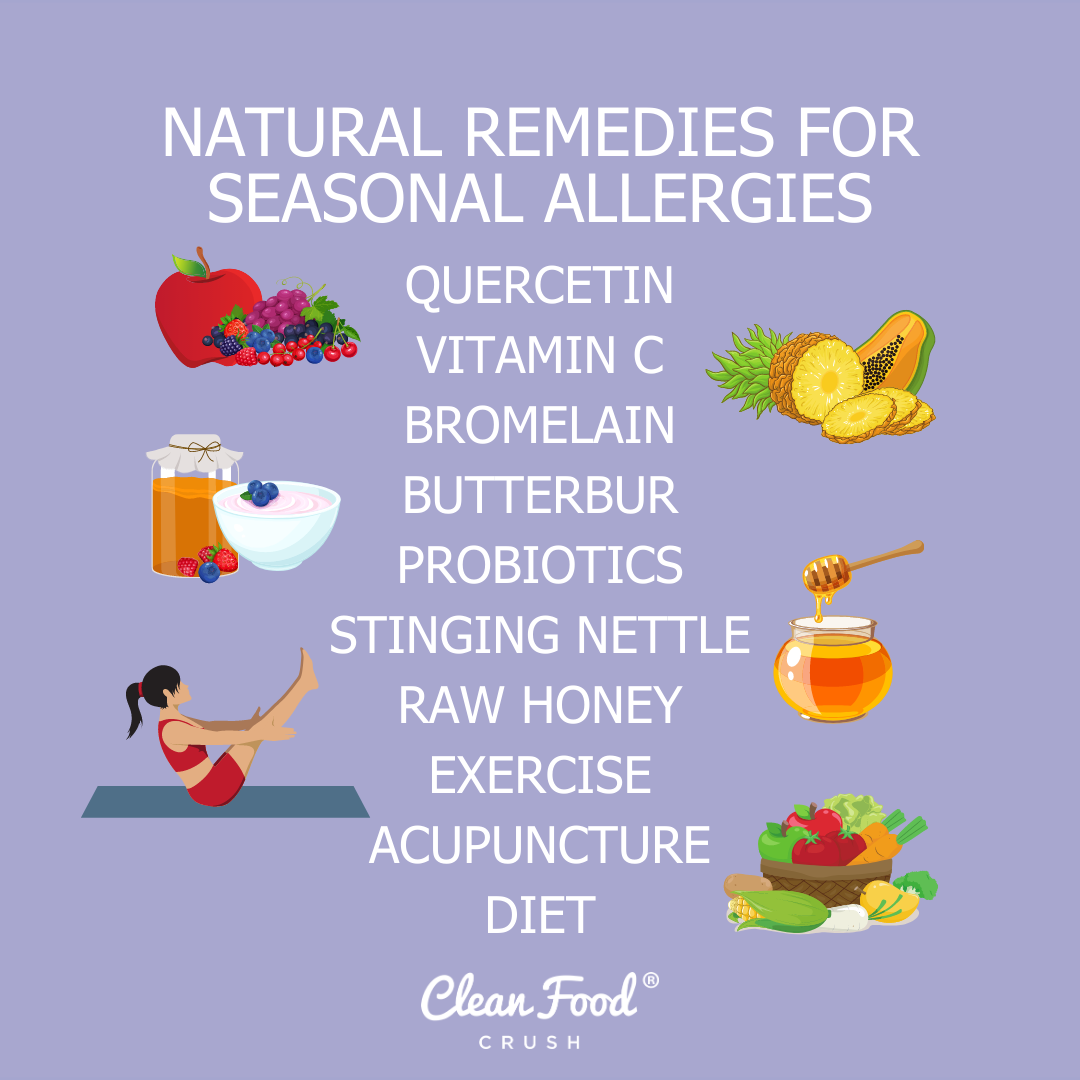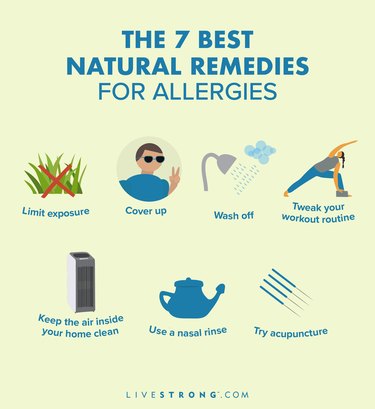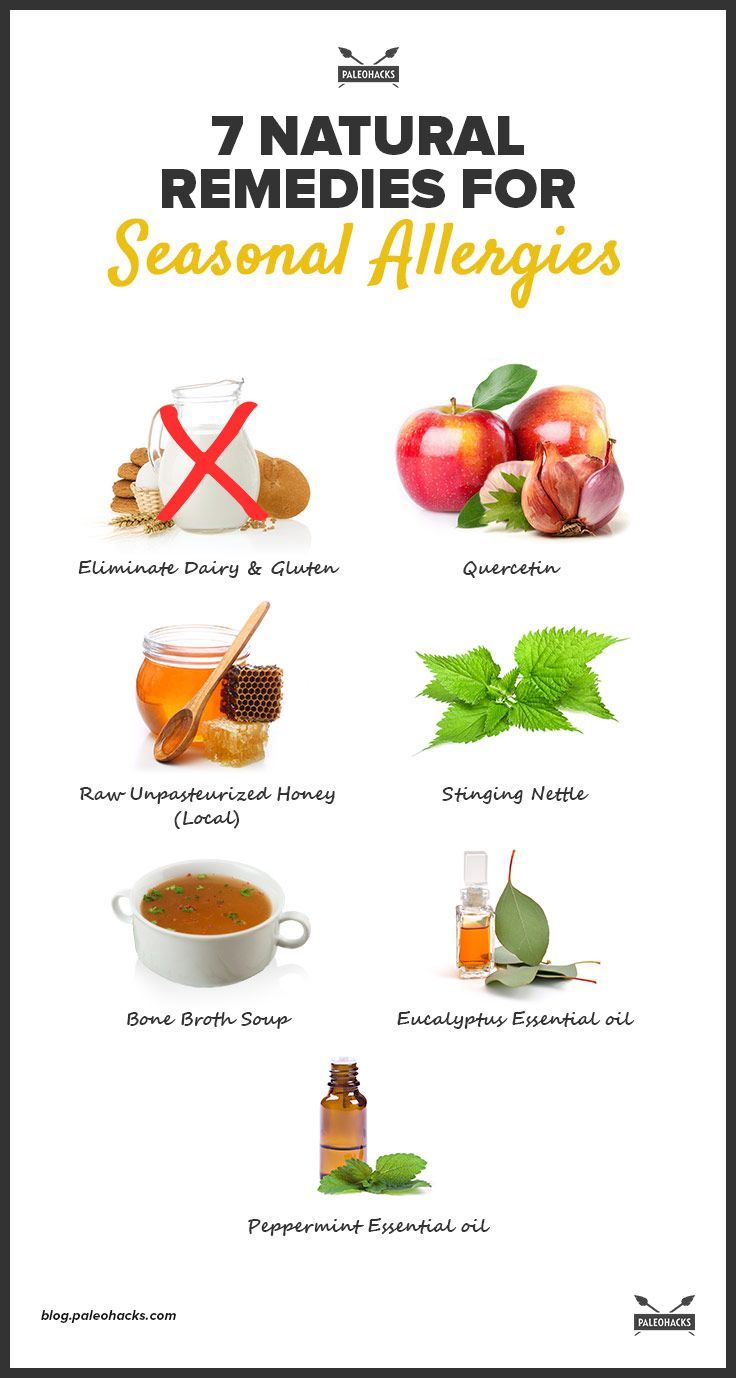Natural remedies such as nasal rinses, honey, and acupuncture can effectively alleviate symptoms of seasonal allergies. Seasonal allergies can be a nuisance, causing symptoms like sneezing, congestion, and itchy eyes.
While over-the-counter medications can provide relief, many people prefer to explore natural remedies. These options are often more cost-effective and have fewer side effects. Nasal rinses, such as saline sprays or neti pots, can help to flush out irritants and reduce congestion.
Raw local honey is believed to help build immunity to allergens when consumed regularly. Acupuncture is another option that has shown promise in relieving symptoms by targeting imbalances in the body. Incorporating these natural remedies into your allergy management plan may provide you with some much-needed relief.

Credit: cleanfoodcrush.com
Understanding Seasonal Allergies
If you find yourself sneezing, itching, and dealing with a runny nose during certain times of the year, you may be experiencing seasonal allergies. Seasonal allergies, also known as hay fever or allergic rhinitis, are allergic reactions that occur in response to specific allergens present during certain times of the year. Understanding what causes seasonal allergies and recognizing their common symptoms can help you find relief and manage your symptoms effectively.
Causes Of Seasonal Allergies
Seasonal allergies are typically triggered by airborne allergens such as pollen from trees, grass, and weeds. When these allergens come into contact with the mucous membranes in your nose and mouth, your immune system perceives them as harmful and reacts by releasing chemicals, including histamines. Histamines cause the various symptoms associated with seasonal allergies, such as sneezing, itching, and nasal congestion.
Common Symptoms Of Seasonal Allergies
The most common symptoms of seasonal allergies include:
- Sneezing
- Runny or stuffy nose
- Itchy or watery eyes
- Sore throat
- Coughing
- Headache
These symptoms can significantly impact your daily activities and overall quality of life. It’s important to recognize these symptoms early on and seek appropriate treatment to alleviate your discomfort.
Natural Remedies For Seasonal Allergies
Seasonal allergies can make even the most enjoyable time of the year unbearable for those affected. Luckily, there are several natural remedies that can help alleviate the symptoms and provide relief. In this post, we will explore three effective methods to combat seasonal allergies: the use of herbal supplements, effective nasal irrigation techniques, and the power of essential oils for allergy relief.
Use Of Herbal Supplements
Herbal supplements have long been used to treat a variety of ailments, including seasonal allergies. They can help boost the immune system and reduce inflammation, providing much-needed relief. Some popular herbal supplements for allergies include:
- Quercetin: This antioxidant supports the body’s immune response and helps reduce histamine release, providing relief from allergy symptoms. Sources of quercetin include onions, apples, and green tea.
- Butterbur: Research has shown that butterbur can be as effective as antihistamines in relieving allergy symptoms. However, it’s essential to choose a butterbur supplement that is free of pyrrolizidine alkaloids (PA), as these can be harmful to the liver.
- Stinging nettle: Stinging nettle contains natural antihistamines that can help reduce symptoms such as sneezing and itching. It can be taken in the form of tea, capsules, or tincture.
Effective Nasal Irrigation Techniques
Nasal irrigation, also known as saline rinsing, is a natural and effective way to relieve congestion and flush out allergens from the nasal passages. By using a saline solution or a neti pot, you can irrigate the nasal passages, clear mucus, and reduce inflammation. Here are a few tips for effective nasal irrigation:
- Use distilled or sterile water to avoid the risk of infection.
- Mix the saline solution according to the instructions, or use pre-made saline packets.
- Tilt your head to the side and gently pour the saline solution into one nostril, allowing it to flow out from the other nostril.
- Repeat the process on the other side.
- Ensure the neti pot or nasal rinse device is thoroughly cleaned and dried between uses to prevent bacteria growth.
Essential Oils For Allergy Relief
Essential oils have gained popularity for their natural therapeutic properties, and they can also provide relief from seasonal allergies. Certain essential oils possess anti-inflammatory, antihistamine, and decongestant properties. Here are some essential oils that may help with allergy symptoms:
- Lavender oil: Known for its calming and soothing effects, lavender oil can help alleviate allergic reactions and reduce inflammation.
- Peppermint oil: The menthol in peppermint oil acts as a natural decongestant, providing temporary relief from nasal congestion.
- Eucalyptus oil: Inhalation of eucalyptus oil can help open up the airways and relieve respiratory symptoms caused by allergies.
Before using essential oils, it’s essential to dilute them properly and conduct a patch test to ensure you don’t have any adverse reactions.
Lifestyle Changes To Alleviate Seasonal Allergies
Looking to alleviate seasonal allergies naturally? Make some lifestyle changes like keeping windows closed, practicing good hygiene, using natural remedies like honey and saline rinses, and reducing indoor allergens. Take control of your allergies without relying solely on medications.
Managing Indoor Air Quality
To alleviate the symptoms of seasonal allergies, it is important to pay attention to the quality of the air inside your home. Implementing certain lifestyle changes can help you in this regard.
Firstly, make sure to keep your home clean and dust-free. Dusting surfaces regularly and vacuuming using a high-efficiency particulate air (HEPA) filter can help in reducing allergens indoors.
Another effective way to manage indoor air quality is by using air purifiers. These devices can remove allergens such as pollen, mold spores, and pet dander from the air, making it cleaner and easier for you to breathe.
If you have pets, it is advisable to keep them out of your bedroom or any other areas where you spend a significant amount of time. This can help in minimizing exposure to allergens that might be present on their fur.
Dietary Modifications
What you eat can also play a role in alleviating the symptoms of seasonal allergies. Making certain dietary modifications can offer relief and help you manage your allergies more effectively.
First and foremost, incorporating foods that are rich in vitamin C and antioxidants can boost your immune system and reduce allergies. Citrus fruits, berries, leafy greens, and bell peppers are excellent sources of vitamin C.
Omega-3 fatty acids, found in foods like fatty fish, walnuts, and flaxseeds, have anti-inflammatory properties that can reduce the severity of allergies symptoms.
It is important to note that some individuals may have specific food allergies or sensitivities that can exacerbate their seasonal allergies. Identifying and avoiding these trigger foods can help in minimizing allergic reactions.
Avoiding Triggers
Avoiding triggers that worsen your seasonal allergies is crucial in managing your symptoms effectively. Here are a few strategies you can follow:
- Limit outdoor activities during peak pollen times, typically in the morning and evening.
- Keep windows closed, especially on days when the pollen count is high.
- Wear sunglasses to protect your eyes from airborne allergens.
- Consider using a pollen mask or nasal filters when spending time outdoors.
Additionally, it is important to regularly wash your bedding and clothes to remove any pollen or other allergens that might have accumulated on them. Taking a shower and washing your hair before bedtime can also help in reducing allergens in your sleeping area.
By implementing these lifestyle changes, you can effectively manage your seasonal allergies and enjoy a more comfortable and symptom-free life.
:max_bytes(150000):strip_icc()/tea-for-allergies-5197793_FINAL-d5f96a3f4f1440cf92b5718a88d1dbd8.jpg)
Credit: www.verywellhealth.com

Credit: www.livestrong.com
Frequently Asked Questions On Natural Remedies For Seasonal Allergies
What Is The Best Home Remedy For Seasonal Allergies?
The best home remedy for seasonal allergies is to clean and dust your home frequently. Avoiding outdoor activities during peak pollen times can also help. Drinking plenty of water and consuming vitamin C-rich foods can boost your immune system. Additionally, using saline nasal rinses can provide relief.
How Do You Treat Severe Pollen Allergies?
Treat severe pollen allergies by taking antihistamines, using nasal sprays, and applying allergy eye drops to relieve symptoms. Avoid going outdoors during high pollen times, close windows, use air purifiers, and wash clothes frequently. Consult an allergist for other possible treatments like immunotherapy.
What Is The Strongest Natural Antihistamine?
Turmeric is recognized as the strongest natural antihistamine due to its active compound called curcumin. It can help reduce allergy symptoms by blocking the release of histamines in the body. Its anti-inflammatory properties also provide relief from nasal congestion, itching, and sneezing.
What Helps With Major Allergies?
To manage major allergies, options include avoiding triggers, medication like antihistamines or nasal sprays, immunotherapy, and making lifestyle changes like keeping a clean environment and wearing a mask outdoors.
Conclusion
These natural remedies can help alleviate the symptoms of seasonal allergies. From consuming local honey to using essential oils and incorporating anti-inflammatory foods into your diet, there are various options available. By opting for these natural methods, you can potentially reduce your reliance on medication and find relief from seasonal allergies in a more holistic way.
Remember to consult with a healthcare professional before starting any new regimen.
